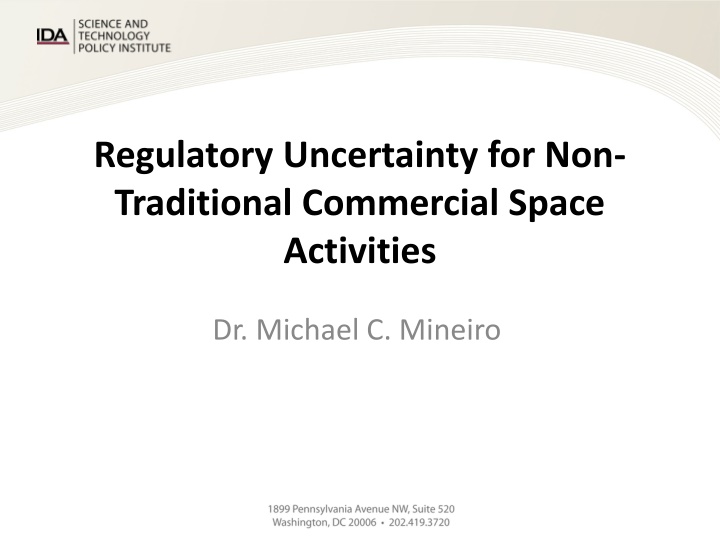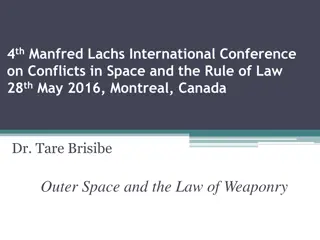
Regulatory Uncertainty in Commercial Space Activities
Delve into the complexities of regulatory uncertainties surrounding non-traditional commercial space activities, with a focus on international legal frameworks, including the roles of governmental and non-governmental entities. Explore the sufficiency of US domestic regulatory regimes and potential gaps affecting various space operations.
Download Presentation

Please find below an Image/Link to download the presentation.
The content on the website is provided AS IS for your information and personal use only. It may not be sold, licensed, or shared on other websites without obtaining consent from the author. If you encounter any issues during the download, it is possible that the publisher has removed the file from their server.
You are allowed to download the files provided on this website for personal or commercial use, subject to the condition that they are used lawfully. All files are the property of their respective owners.
The content on the website is provided AS IS for your information and personal use only. It may not be sold, licensed, or shared on other websites without obtaining consent from the author.
E N D
Presentation Transcript
Regulatory Uncertainty for Non- Traditional Commercial Space Activities Dr. Michael C. Mineiro
INTERNATIONAL LEGAL BACKGROUND 2
Article 6 of the 1967 Outer Space Treaty States Parties to the Treaty shall bear international responsibility for national activities in outer space, including the Moon and other celestial bodies, whether such activities are carried on by governmental agencies or by non-governmental entities, and for assuring that national activities are carried out in conformity with the provisions set forth in the present Treaty. The activities of non- governmental entities in outer space, including the Moon and other celestial bodies, shall require authorization and continuing supervision by the appropriate State Party to the Treaty. 3
International Responsibility The general principle, drawn from State practice and international judicial decisions, is that the conduct of a person or group of persons not acting on behalf of the State is not considered as an act of the State under international law. Under the Outer Space Treaty ( Treaty ), a special rule ( lex specialis ) is established under which the conduct of non-governmental entities are considered an act of the State; at least to the extent such activities are national activities. 4
CASE STUDY US REGULATORY REGIME 5
Sufficiency of U.S. Domestic Regulatory Regime Three parties to consider when evaluating the sufficiency of a domestic regulatory regime implementing Article VI s non-governmental entity authorization and supervision requirement: 1) Third-Party States, 2) State(s) responsible, and 3) The non-governmental entity. 6
US Domestic Regulatory Gap Existing Regime: NOAA licenses private remote sensing space systems, FCC licenses the operation of space stations that transmit radio signals, and FAA licenses the operation of launch and re-entry vehicles and sites. Non-traditional space activities (e.g. on-orbit servicing, space-to-space for-profit remote sensing, in-situ celestial resource extraction) Practical Concerns: Article 6 Auth & Supervision Obligation Exposure to International Liability State Practice Setting Precedent Negatively Impacting the Private Sector 7
Example: Current U.S. Law and Regulation No clear legal or regulatory authority to authorize and supervise U.S. private space- based on-orbit remote sensing (ORS) systems. NOAA FAA FCC
Conclusions Current regulatory regime does not provide for mechanisms to authorize or supervise novel on- orbit activities like those currently being developed by the U.S. private sector. The United States needs to reform its domestic regulatory regime to effectuate authorization and supervision of these novel non-governmental activities. The United States should begin to socialize internationally the challenges it faces in its domestic regulatory regime and facilitate the sharing of domestic regulatory authorization and supervision best practices.













